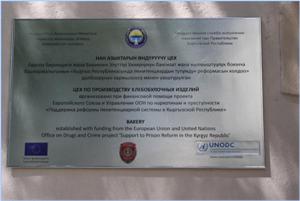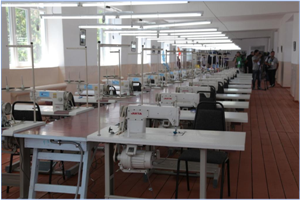"When I Get out I Will Work as a Seamstress" - Spotlight on Prisoner Employment and Social Reintegration in Kyrgyz Republic
 The Kyrgyz Prison Service has recently launched a series of income generating activities in two of its prisons. A soya milk production line and a sowing workshop have been established in the country's only prison for female offenders. A modernized bakery is now operational in one of the largest Kyrgyz prisons providing bread for over 1000 inmates. These production workshops have been created with the support of the European Union/UNODC project 'Support to Prison Reform in the Kyrgyz Republic'. The new facilities were officially opened during launch ceremonies at the two prisons on 18 July and 29 August 2012.
The Kyrgyz Prison Service has recently launched a series of income generating activities in two of its prisons. A soya milk production line and a sowing workshop have been established in the country's only prison for female offenders. A modernized bakery is now operational in one of the largest Kyrgyz prisons providing bread for over 1000 inmates. These production workshops have been created with the support of the European Union/UNODC project 'Support to Prison Reform in the Kyrgyz Republic'. The new facilities were officially opened during launch ceremonies at the two prisons on 18 July and 29 August 2012.
Developing small scale production in prisons
"The development of vocational training and work opportunities is a key priority of our new prison reform strategy", said Kalmurat Baitoloev, Deputy Chairperson of the State Service for the Execution of Punishments, on the occasion of the launch of the new production facilities in the female prison in Stepnoe village not far from the Kyrgyz capital Bishkek.
In 2011, only 13% of all prisoners were engaged in productive work. Although this is an increase compared to 2007 when 7.4% of prisoners were employed, the figure remains low. As noted by the Head of the Parliamentary Committee on Anti-Corruption Turatbek Madilbekov, "In Soviet times all prisons had production facilities. In 20 years of independence this productive capacity has been destroyed".
Since 2010, work has been under way to launch several new small-scale income generating programmes in the Kyrgyz penitentiary system. Within the framework of the EU/UNODC project 'Support to Prison Reform in the Kyrgyz Republic' an Expert Group on Prison Income Generating Activities was established, which sollicited prison managers to submit business plans. In 2011, the Expert Group approved three of these business plans for the creation of workshops to produce soya milk, bread and textiles. The business plans are worth a total of 231,000 USD.
"With the support of the project, construction materials, furniture and equipment have been procured for the creation of the production facilities", noted Ambassador Chantal Hebberecht, Head of the European Union Delegation to Kyrgyzstan. "The launch of these new income generating activities will contribute to realizing our common goal to improve conditions in places of detention and promote social rehabilitation", she added.
A win-win situation for prisons and prisoners alike

In the new facilities, classrooms have been created so that prisoner employment can be combined with vocational training to enhance prisoners' chances of finding work following their release.
In the female prison in Stepnoe village, which houses 260 convicted women, a lyceum is operational. According to the Director of the school, Alexander Harichkov, prisoners can already be trained to become hairdressers and seamstresses. "From 1 September a first group of 15 women will also start a 5 month course on soya milk production", he stated.
The new production facilities create a win-win situation for both prisoners and the prisons in which they are detained. During the opening ceremony in July, one female prisoner who works in the new sowing workshop said she receives a monthly salary of 2,000 Kyrgyz Som or 42 USD. "When I get out, I will definitely continue to work as a seamstress", she mentioned. Another employee said: "Before I received some money from my family back home, but they have very little to live on themselves. Now I can pay for everything myself and help my family".
Whilst the prisoners have increased opportunities to work and receive a salary, the prisons benefit from the prisoners' work which will bring in additional income to complement their constraint budgets. "For the moment we produce soya milk for consumption within the prisons", said the Head of the Kyrgyz Prison Service, Alik Mamyrkulov. "We plan to develop cooperation with the Ministry of Health to supply hospitals with soya milk and for our sowing workshop we have already received an order for 2,500 uniforms from the State Customs Service", he added.
Vice-Prime Minister of the Kyrgyz Republic Gulnara Asimbekova also attended the opening ceremony in the female colony in July. She commented on the sustainability of the income generating enterprises. "Until May this year prison enterprises had to devolve 50% of their profits into the State budget", she said. "But following a legislative amendment profits now remain fully at the disposal of the Prison Service". According to the Prison Service, prison enterprises have made profits amounting to 1,826,670 Som (i.e. approximately 40,000 USD) since 2011, which can now be re-invested in the development of the prison system without any taxation from the State as previously.
During the launch of the modernized bakery in the male prison in Novo Pokrovka village on 29 August, Deputy Chair of the Prison Service Kalmurat Baitoloev announced that the Kyrgyz Government has committed 50 million Som or 1 million USD from the State budget for the promotion of prison income generating activities and refurbishment. Of this amount 22 million Som (the equivalent of 460,000 USD) has already been disbursed for income generating activities. This is the first major allocation of State funds specifically for the promotion of prisoner employment and income generation in 20 years.
The EU/UNODC project "Support to Prison Reform in the Kyrgyz Republic" will continue to sustain these efforts until June 2013 with technical assistance and legal advice in relation to the development of a National Programme for Prison Income Generating Activities and the establishment of a State Enterprise under the Kyrgyz Prison Service to manage and oversee the income generating activities in Kyrgyzstan's prisons in the years to come.